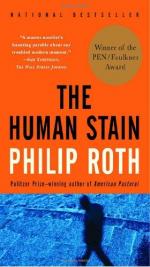|
This section contains 4,773 words (approx. 16 pages at 300 words per page) |

|
SOURCE: Wood, James. “The Cost of Clarity.” New Republic 222, nos. 16 & 17 (17 & 24 April 2000): 70-8.
In the following mixed review of The Human Stain, Wood traces Roth's literary development, asserting he is “an extraordinarily intelligent novelist” whose intellect may actually contribute to his “vulgarianism.”
If Philip Roth began his career as a fine realist who combed his distinguished prose in conventional directions, it might be said that he is ending it as a coarse realist who is all bristles. His early work approached character with a sensitive sentimentality; his late work dissolves character in sentimental essayism. He has become a vulgar naturalist of the emotions, a kind of H. G. Wells of the inner life—bludgeoningly explicit, crudely emphatic, always turning the convoy of consciousness into a freight train of emotions, determined to illuminate what might better be crepuscular, to color what might better be gray, to haul into speakability the...
|
This section contains 4,773 words (approx. 16 pages at 300 words per page) |

|


